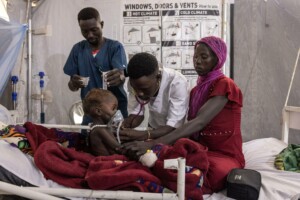IOM registers 14,500 people displaced, 111,500 returnees in Sudan
In the first three quarters of 2019, the International Organisation for Migration (IOM) registered 14,500 displaced and 111,500 returnees in six states in Sudan.
The highest number of displaced (5,800 people) was registered in South Darfur.
Returns have been recorded in all Darfur states, most likely due to the improved security, cessation of hostilities, and peace-building initiatives of the Sudanese government and partners. The highest number of returnees (44,500 people) was registered in North Darfur.
 South Darfuris fleeing fighting between government troops and rebel fighters near Muhajiriya, 2009 (Jan-Joseph Stok)
South Darfuris fleeing fighting between government troops and rebel fighters near Muhajiriya, 2009 (Jan-Joseph Stok)
In the first three quarters of 2019, the International Organisation for Migration (IOM) registered 14,500 displaced and 111,500 returnees in six states in Sudan.
The highest number of displaced (5,800 people) was registered in South Darfur.
Returns have been recorded in all Darfur states, most likely due to the improved security, cessation of hostilities, and peace-building initiatives of the Sudanese government and partners. The highest number of returnees (44,500 people) was registered in North Darfur.
There are still concerns about services in return areas, which often lack even the most basic of services that can impact the sustainability of these returns, the UN Office for the Coordination of Humanitarian Affairs (OCHA) in Sudan said in its Situation Report on Thursday.
The government, with the assistance of partners, will need to ensure that return locations have the necessary basic services, including protection, water, nutrition sanitation, hygiene, health care, and education.
IOM uses the displacement tracking matrix (DTM) system to track and monitor displacement and population movements. The registration data is used for beneficiary selection, vulnerability targeting and programming, OCHA explained.
Radio Dabanga’s editorial independence means that we can continue to provide factual updates about political developments to Sudanese and international actors, educate people about how to avoid outbreaks of infectious diseases, and provide a window to the world for those in all corners of Sudan. Support Radio Dabanga for as little as €2.50, the equivalent of a cup of coffee.












 and then
and then